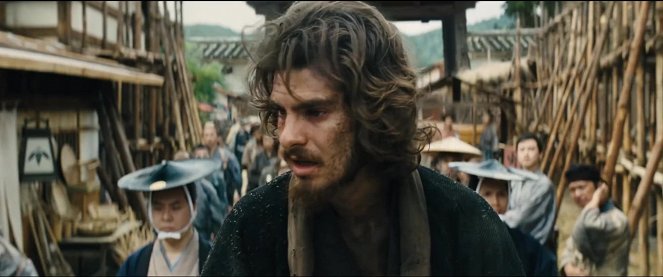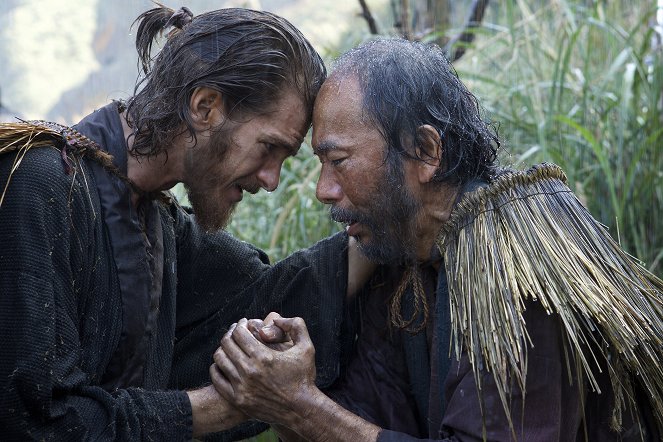Directed by:
Martin ScorseseCinematography:
Rodrigo PrietoCast:
Andrew Garfield, Adam Driver, Liam Neeson, 浅野忠信, Ciarán Hinds, Shin'ya Tsukamoto, Yōsuke Kubozuka, Ogata Issei, Hiroyuki Tanaka, Ryō Kase, 小松菜奈, 美知枝 (more)Plots(1)
Martin Scorsese’s Silence tells the story of two Christian missionaries (Andrew Garfield and Adam Driver) who face the ultimate test of faith when they travel to Japan in search of their missing mentor (Liam Neeson) - at a time when Christianity was outlawed and their presence forbidden. The celebrated director’s 28-year journey to bring Shusaku Endo’s 1966 acclaimed novel to life is an epic masterpiece examining the spiritual and religious question of God’s silence in the face of human suffering. (StudioCanal UK)
(more)Videos (19)
Reviews (12)
After releasing masterfully crafted genre movies that won the favor of mass audiences, Martin Scorsese tried his hand at a more demanding project. And just like in The Last Temptation of Christ and Kundun, he turned his attention to religion. Built on dialogue, atmospheric shots of the given locations and subtle use of sounds, Silence is a slow film almost without any music. The structure is reminiscent of Coppola’s Apocalypse Now. Even as an atheist, I was surprised to enjoy the psychological analyses of the characters and the philosophical musings about the importance and consequences of faith, as well as the responsibility of its promulgators. Andrew Garfield is really, REALLY good.
()
Personalities like Martin Scorsese have the power to make the general public interested in subjects they choose. Such a personal topic for Scorsese was the novel "Silence" by Shūsaku Endō, which he presented to Western viewers 45 years after its original Japanese adaptation Silence. However, it is very difficult to establish a personal connection to the story of Portuguese Jesuits on a Japanese mission in the 17th century. The spiritual atmosphere and beautiful landscape are certainly captivating, but A-list actors like Andrew Garfield, Adam Driver, and Liam Neeson are naturally more suited to a different context.
()
One star for perfect cinematography, the rest fell victim to utter boredom and annoying Catholic propaganda. The answer to most of the questions asked by Father Rodrigues could be: "Because you came here forcing your delusions on us!" Fortunately, the Japanese did not make the same mistake as the Aztecs and Incas. They allowed the Catholics to become martyrs, thus avoiding the Conquista and the Holy Inquisition. The film was awfully long, and the story was so monotonous it dragged on like a snail soaked in honey. I wished the main characters a slow and painful death, and I was secretly hoping that one of the Japanese would finally run out of patience, reach for a katana and create a ‘pagan's cut,’ cutting the film shorter by at least a third.
()
Martin Scorsese belongs to the directors whom I adore, and it's evident that at his age, he already knows how to make a film, how to make it captivating and beautiful, and how to convey some thoughts that you can ponder. This was done in the film Silence. Great performances, but above all stunning cinematography and direction.
()
The silence of a directorial genius. It has gorgeous cinematography, but that’s something I take for granted and consider mandatory in world-class filmmakers; the dialogues have something to then, and the message is morally unquestionable, carved into the viewer with a surgically precise pace and methodical narrative rhythm. BUT steady pace does not equal quality pace, and I personally didn't become a staunch defender of the art of filmmaking in order to patiently stoke my faith in a director's divine abilities, which began to fade after a few dozen emotionally catatonic minutes, and even after 160 long minutes, it didn't even come close to rediscovering itself, unlike the steadfast protagonist. To fully appreciate the film on a purely narrative level, I guess I wouldn't have to be such a die-hard atheist and hardened ignoramus of man's blind faith in supernatural forces and the hellish consequences of betraying one's own beliefs; to enjoy it as a visual self-questioning catharsis, it wouldn't have to talk and repeat so much simple, universally understood religious motifs. God bless Scorsese for taking on such heavy and massively impenetrable material in the first place, but this time I dare to tread on his sacrament and I can honestly say that if Bruce Wayne had popped up behind Liam Neeson's back at the end and kicked his ass with kung fu, I might have been a lot happier with the outcome. Kundun, although with a less serious subject, was much more enjoyable.
()



Ads